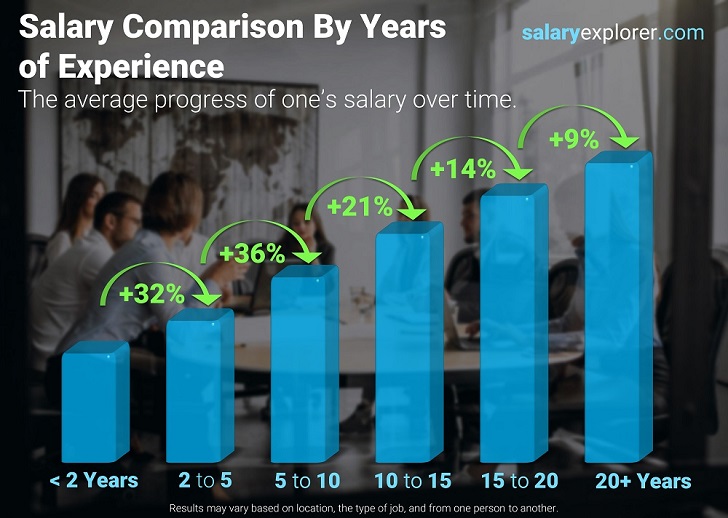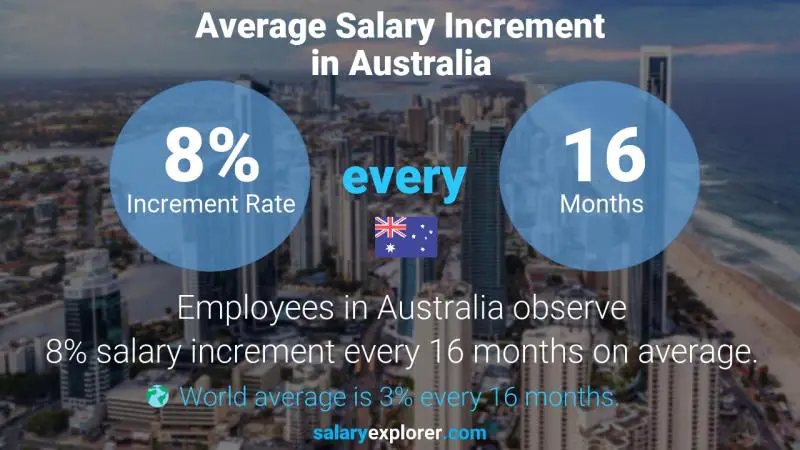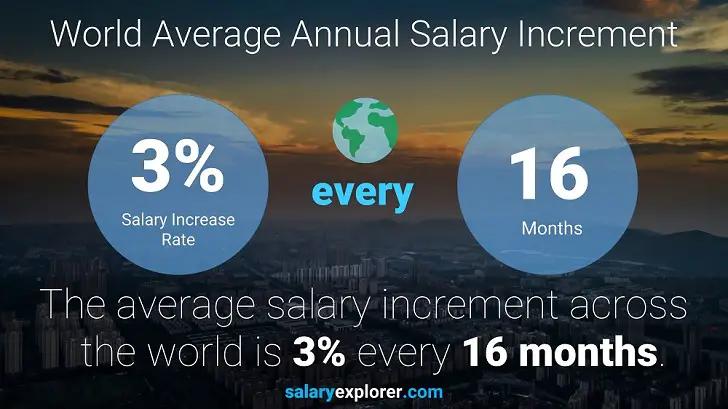Facility Operations Manager Average Salary in Melbourne 2024
How much money does a person working as Facility Operations Manager make in Melbourne?

LOW
55,500
AUD AVERAGE
103,000
AUD HIGH
155,000
AUD
A person working as Facility Operations Manager in Melbourne typically earns around 103,000 AUD. Salaries range from 55,500 AUD (lowest) to 155,000 AUD (highest).
Salary Variance
This is the average salary including housing, transport, and other benefits. Facility Operations Manager salaries in Melbourne vary drastically based on experience, skills, gender, or location. Below you will find a detailed breakdown based on many different criteria.
Facility Operations Manager Pay Scale and Salaries in Melbourne

Salary Structure and Pay Scale Comparison
91,600 AUD or more
82,000 to 91,600 AUD
61,000 AUD or less
61,000 to 82,000 AUD
 55,500 AUD |
 91,900 AUD |
 155,000 AUD |
Median Salary, maximum and minimum salary, minimum wage, starting salary, and the salary range
Salary Range, Minimum Wage, and Starting Salary
Salaries for the position Facility Operations Manager in Melbourne range from 55,500 AUD (starting salary) to 155,000 AUD (maximum salary). It should be noted that the given figure is not the legally mandated minimum wage; rather, it represents the lowest figure reported in a salary survey that included thousands of participants and professionals from all regions of the country.
Median Salary
With a median salary of 91,900 AUD, half of the professionals who work as Facility Operations Manager in Melbourne earn less than this amount, and the other half earn more. The median salary denotes the middle value of salaries. Ideally, you would want to belong to the group earning more than the median salary, located on the right side of the salary distribution graph.
Percentiles and Salary Scale
The median is closely associated with two other values known as the 25th and 75th percentiles. By examining the salary distribution chart, it can be determined that 25% of professionals employed as Facility Operations Manager in Melbourne earn less than 76,900 AUD, while 75% earn more. Similarly, the chart shows that 75% earn less than 104,000 AUD while 25% earn more.
Pay Scale Structure
To provide a better understanding of expected salaries, we categorized the frequently occurring salaries into different ranges. This approach provides a more precise representation of salary distribution for the job title Facility Operations Manager in Melbourne compared to simply calculating the average. The majority of reported salaries, approximately 65%, fall within the range of 61,000 AUD to 82,000 AUD. About 20% of salaries are below the 61,000 AUD mark, while 10% fall within the range of 82,000 AUD to 91,600 AUD. Only 5% of individuals have salaries exceeding 91,600 AUD.
Salary Comparison by Years of Experience / Facility Operations Manager / Melbourne
How do experience and age affect pay?
| 0 - 2 Years | 64,500 AUD | |
| 2 - 5 Years | +26% | 81,500 AUD |
| 5 - 10 Years | +32% | 107,000 AUD |
| 10 - 15 Years | +18% | 126,000 AUD |
| 15 - 20 Years | +11% | 140,000 AUD |
| 20+ Years | +6% | 149,000 AUD |

The experience level is the most important factor in determining the salary. Naturally, the more years of experience the higher the wage. We broke down salaries by experience level for people working as Facility Operations Manager and this is what we found.
Employees with less than two years of experience earn approximately 64,500 AUD.
While someone with an experience level between two and five years is expected to earn 81,500 AUD, 26% more than someone with less than two year's experience.
Moving forward, an experience level between five and ten years lands a salary of 107,000 AUD, 32% more than someone with two to five years of experience.
Additionally, professionals whose expertise span anywhere between ten and fifteen years get a salary equivalent to 126,000 AUD, 18% more than someone with five to ten years of experience.
If the experience level is between fifteen and twenty years, then the expected wage is 140,000 AUD, 11% more than someone with ten to fifteen years of experience.
Lastly, employees with more than twenty years of professional experience get a salary of 149,000 AUD, 6% more than people with fifteen to twenty years of experience.
Typical Salary Progress for Most Careers

Salary Comparison By Education / Facility Operations Manager / Melbourne
How do education levels affect salaries?
Displayed below is the average salary variance between different education levels of professionals working as Facility Operations Manager.
| High School | 78,500 AUD | |
| Certificate or Diploma | +13% | 88,500 AUD |
| Bachelor's Degree | +32% | 116,000 AUD |
| Master's Degree | +24% | 144,000 AUD |

We all know that higher education equals a bigger salary, but how much more money can a degree add to your income? We broke down salaries by education level for the position Facility Operations Manager in order to make a comparison.
Level 1: High School
Employees at this education level have an average salary of 78,500 AUD.
Level 2: Certificate or Diploma
At this level, the average salary becomes 88,500 AUD, 13% more than the previous level.
Level 3: Bachelor's Degree
At this level, the average salary becomes 116,000 AUD, 32% more than the previous level.
Level 4: Master's Degree
At this level, the average salary becomes 144,000 AUD, 24% more than the previous level.
Is a Master's degree or an MBA worth it? Should you pursue higher education?
A Master's degree program or any post-graduate program in Australia costs anywhere from 38,000 AUD to 114,000 AUD and lasts approximately two years. That is quite an investment.
You can't really expect any salary increases during the study period, assuming you already have a job. In most cases, a salary review is conducted once education is completed and the degree has been attained.
Many people pursue higher education as a tactic to switch to a higher-paying job. The numbers seem to support the theory. The average increase in compensation while changing jobs is approximately 10% more than the customary salary increment.
If you can afford the costs of higher education, the return on investment is definitely worth it. You should be able to recover the costs in roughly a year or so.
Typical Salary Difference by Education for Most Careers

Salary and Compensation Comparison By Gender / Facility Operations Manager / Melbourne

Though gender should not have an effect on pay, in reality, it does. So who gets paid more: men or women? For the people who work as Facility Operations Manager in Australia, the average difference between the salary of male and female employees is 5%.
| Male | 103,000 AUD | |
| Female | -5% | 97,900 AUD |
Salary Comparison By Gender in Australia for all Careers

Average Annual Salary Increment Percentage / Facility Operations Manager / Melbourne
How much are annual salary increments in Melbourne for individuals working as Facility Operations Manager? How often do employees get salary raises?
Individuals working as Facility Operations Manager in Australia are likely to observe a salary increase of approximately % every months. The national average annual increment for all professions combined is 8% granted to employees every 16 months.

Australia / All Professions

The term Annual Salary Increase usually refers to the increase in 12 calendar month period, but because it is rare that people get their salaries reviewed exactly on the one-year mark, it is more meaningful to know the frequency and the rate at the time of the increase.
How to calculate the salary increment percentage?
The annual salary Increase in a calendar year (12 months) can be easily calculated as follows: Annual Salary Increase = Increase Rate x 12 / Increase Frequency
Worldwide Salary Raises: All Countries and All Jobs

Salary Packages and Schemes
Not all compensation increases are reflected directly in the salary. Some companies offer upgraded packages to their staff instead of cash money. The figures displayed here account only for direct increments to the base salary.
Bonus and Incentive Rates / Facility Operations Manager / Australia
How much and how often are bonuses being awarded? Share This Chart Tweet Get Chart Linkhttp://www.salaryexplorer.com/charts/australia/facilities-maintenance-repair/facility-operations-manager/annual-salary-bonus-rate-australia-facility-operations-manager.jpg
Share This Chart Tweet Get Chart Linkhttp://www.salaryexplorer.com/charts/australia/facilities-maintenance-repair/facility-operations-manager/annual-salary-bonus-rate-australia-facility-operations-manager.jpg
100% of surveyed staff reported that they haven't received any bonuses or incentives in the previous year while % said that they received at least one form of monetary bonus.
Those who got bonuses reported rates ranging from % to % of their annual salary.
| Received Bonus | % | |
| No Bonus | 100% |
Types of Bonuses Considered
Individual Performance-Based BonusesThe most standard form of bonus, where the employee is awarded based on their exceptional performance.
Company Performance BonusesOccasionally, some companies like to celebrate excess earnings and profits with their staff collectively in the form of bonuses that are granted to everyone. The amount of the bonus will probably be different from person to person depending on their role within the organization.
Goal-Based BonusesGranted upon achieving an important goal or milestone.
Holiday / End of Year BonusesThese types of bonuses are given without a reason and usually resemble an appreciation token.
Bonuses Are Not Commissions!
People tend to confuse bonuses with commissions. A commission is a prefixed rate at which someone gets paid for items sold or deals completed while a bonus is in most cases arbitrary and unplanned.
What makes a position worthy of good bonuses and a high salary?
The main two types of jobs | |
| Revenue Generators | Supporting Cast |
Employees that are directly involved in generating revenue or profit for the organization. Their field of expertise usually matches the type of business. | Employees that support and facilitate the work of revenue generators. Their expertise is usually different from that of the core business operations. |
Example: | Example: |
Revenue generators usually get more and higher bonuses, higher salaries, and more frequent salary increments. The reason is quite simple: it is easier to quantify your value to the company in monetary terms when you participate in revenue generation.
Bonus Comparison by Seniority Level
Top management personnel and senior employees naturally exhibit higher bonus rates and frequencies than juniors. This is very predictable due to the inherent responsibilities of being higher in the hierarchy. People in top positions can easily get double or triple bonus rates than employees down the pyramid.
Average Hourly Wage / Facility Operations Manager / Melbourne
 49 AUD per hour
49 AUD per hourThe average hourly wage (pay per hour) for individuals working as Facility Operations Manager in Melbourne is 49 AUD.This is the rate they get paid for every worked hour.
About The Hourly Pay Rate
The hourly wage is the salary paid in one worked hour. Usually, jobs are classified into two categories: salaried jobs and hourly jobs. Salaried jobs pay a fixed amount regardless of the hours worked. Hourly jobs pay per worked hour. To convert salary into hourly wage the above formula is used (assuming 5 working days in a week and 8 working hours per day which is the standard for most jobs). The hourly wage calculation may differ slightly depending on the worked hours per week and the annual vacation allowance. The figures mentioned above are good approximations and are considered to be the standard. One major difference between salaried employees and hourly paid employees is overtime eligibility. Salaried employees are usually exempt from overtime as opposed to hourly paid staff.
What is the minimum hourly rate of pay?
The minimum pay rate per hour for people working as Facility Operations Manager in Melbourne is 27 AUD. This is the minimum as per the gathered data in the salary survey not the minimum hourly rate mandated by law.
Salary comparison with similar jobs
| Job Title | Average Salary |
| Facilities / Maintenance / Repair |  -100% -100% | |
| Air Conditioning Technician | 29,000 AUD |  -72% -72% |
| Assembly Supervisor | 48,600 AUD |  -53% -53% |
| Assistant Contract Manager | 114,000 AUD |  +11% +11% |
| Building and Grounds Supervisor | 71,200 AUD |  -31% -31% |
| Building Control Officer | 62,800 AUD |  -39% -39% |
| Building Engineer | 86,700 AUD |  -16% -16% |
| Building Envelope Specialist | 86,700 AUD |  -16% -16% |
| Building Services Engineer | 87,700 AUD |  -15% -15% |
| Building Surveyor | 58,300 AUD |  -43% -43% |
| Calibration Technician | 34,300 AUD |  -67% -67% |
| Carpenter | 38,300 AUD |  -63% -63% |
| Cemetery Manager | 39,300 AUD |  -62% -62% |
| Chief Building Official | 138,000 AUD |  +34% +34% |
| Clinical Facilities Planning Manager | 142,000 AUD |  +38% +38% |
| Construction Laborer | 28,400 AUD |  -72% -72% |
| Contracts Administrator | 75,000 AUD |  -27% -27% |
| Contracts Manager | 125,000 AUD |  +22% +22% |
| Facilities Coordinator | 64,000 AUD |  -38% -38% |
| Facilities Director | 148,000 AUD |  +44% +44% |
| Facilities Engineer | 86,700 AUD |  -16% -16% |
| Facilities Maintenance Manager | 127,000 AUD |  +23% +23% |
| Facilities Maintenance Supervisor | 91,100 AUD |  -11% -11% |
| Facilities Manager | 125,000 AUD |  +22% +22% |
| Facilities Training Specialist | 74,400 AUD |  -28% -28% |
| Facility Energy Manager | 98,000 AUD |  -5% -5% |
| Facility Operations Manager | 103,000 AUD |  +0% +0% |
| Facility Security Specialist | 87,600 AUD |  -15% -15% |
| Field Service Manager | 131,000 AUD |  +27% +27% |
| Field Service Technician | 26,400 AUD |  -74% -74% |
| Fire Alarm System Installer | 47,200 AUD |  -54% -54% |
| Glazier | 27,200 AUD |  -74% -74% |
| Green Roof Installer | 59,500 AUD |  -42% -42% |
| HVAC Mechanic | 28,800 AUD |  -72% -72% |
| HVAC Technician | 29,100 AUD |  -72% -72% |
| Indoor Air Quality Specialist | 61,000 AUD |  -41% -41% |
| Laborer | 28,000 AUD |  -73% -73% |
| Maintenance Fitter | 28,900 AUD |  -72% -72% |
| Maintenance Mechanic | 28,000 AUD |  -73% -73% |
| Maintenance Officer | 29,800 AUD |  -71% -71% |
| Maintenance Planner | 43,400 AUD |  -58% -58% |
| Maintenance Supervisor | 51,100 AUD |  -50% -50% |
| Maintenance Worker | 27,700 AUD |  -73% -73% |
| Mechanic | 27,900 AUD |  -73% -73% |
| Microgrid Technician | 55,900 AUD |  -46% -46% |
| Plant Engineer | 82,500 AUD |  -20% -20% |
| Property Administration Officer | 52,500 AUD |  -49% -49% |
| Renewable Energy Technician | 62,900 AUD |  -39% -39% |
| Robotic Maintenance Technician | 67,900 AUD |  -34% -34% |
| Service Engineer | 79,800 AUD |  -22% -22% |
| Service Operations Manager | 138,000 AUD |  +34% +34% |
| Smart Building Technician | 64,400 AUD |  -37% -37% |
| Technician | 28,400 AUD |  -72% -72% |
| Tool Technician | 27,700 AUD |  -73% -73% |
Salary Comparison By City
| City | Average Salary |
| Melbourne | 103,000 AUD |
| Sydney | 99,900 AUD |
Government vs Private Sector Salary Comparison
Where can you get paid more, working in a private company or the government? The difference between the public or government sector salaries and the private sector salaries in Australia is 5% on average across all career fields.
| Private Sector | 89,000 AUD | |
| Public Sector | +5% | 93,400 AUD |
Salary Statistics and Calculation Guide
What is considered to be a good and competitive salary for the job title Facility Operations Manager in Melbourne?
A good and competitive compensation would range anywhere between 91,900 AUD and 104,000 AUD. This is a very rough estimate. Experience and education play a very huge part in the final earnings.
Gross Salary (before tax) and Net Salary (after tax)
All salary and compensation figures displayed here are gross salary figures, that is the salary before tax deductions. Because taxes may differ across sectors and locations, it is difficult to accurately calculate the net salary after tax for every career.
Base / Basic Salary
The base salary for a careers like Facility Operations Manager in Melbourne ranges from 55,500 AUD to 76,900 AUD. The base salary depends on many factors including experience and education. It is not easy to provide a figure with very little information, so take this range with a grain of salt.
What is the difference between the median and the average salary?
Both are indicators. If your salary is higher than both the average and the median then you are doing very well. If your salary is lower than both, then many people earn more than you and there is plenty of room for improvement. If your wage is between the average and the median, then things can be a bit complicated. We wrote a guide to explain all about the different scenarios. How to compare your salary




